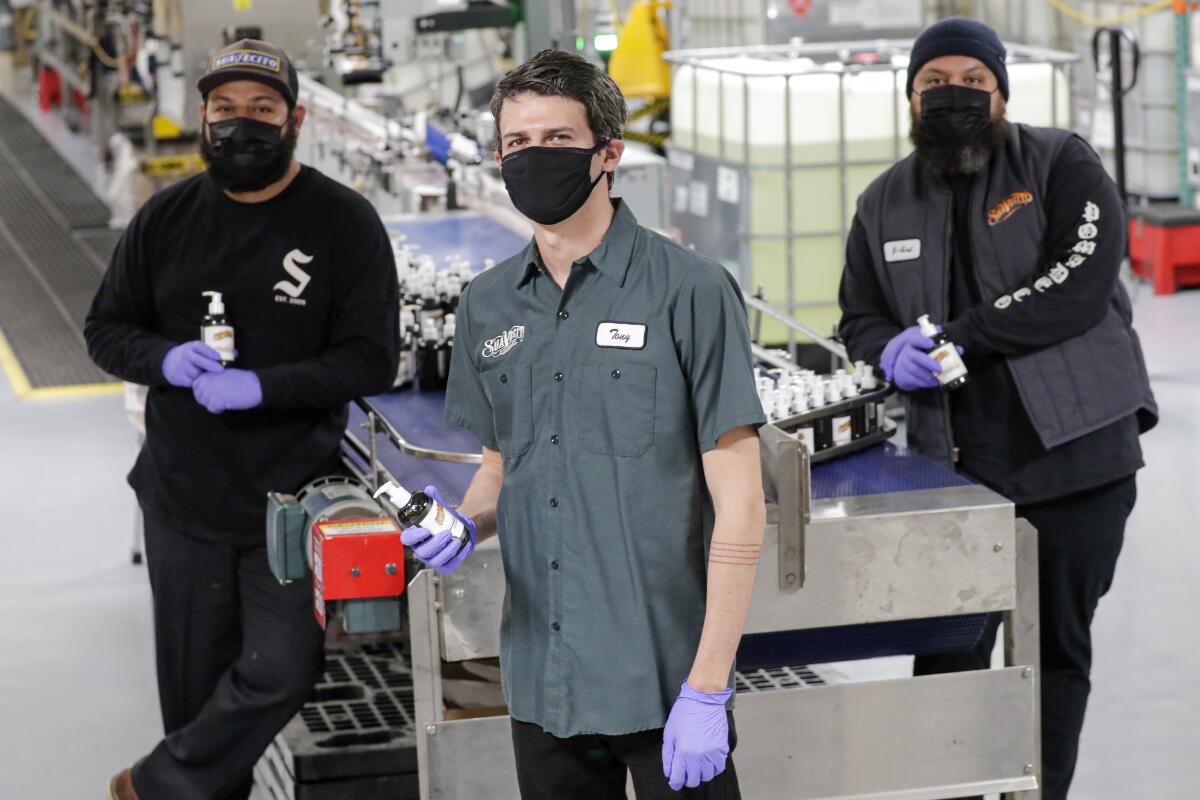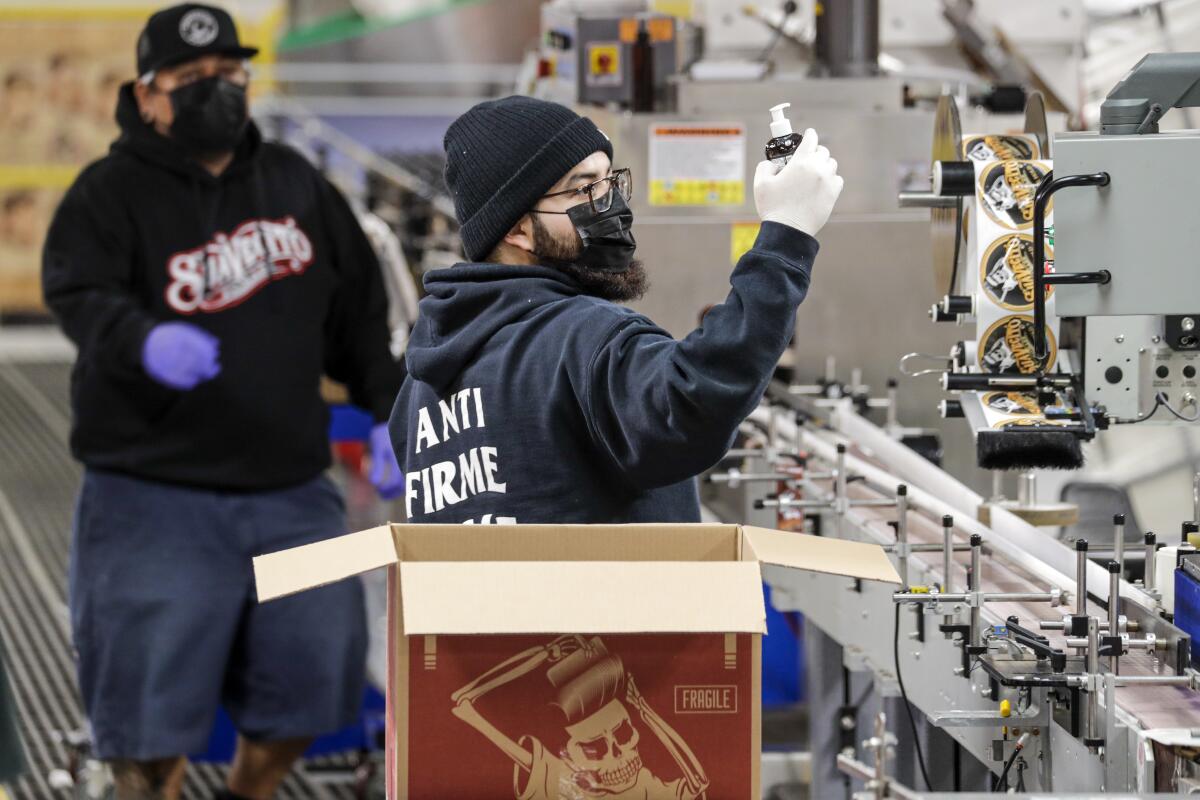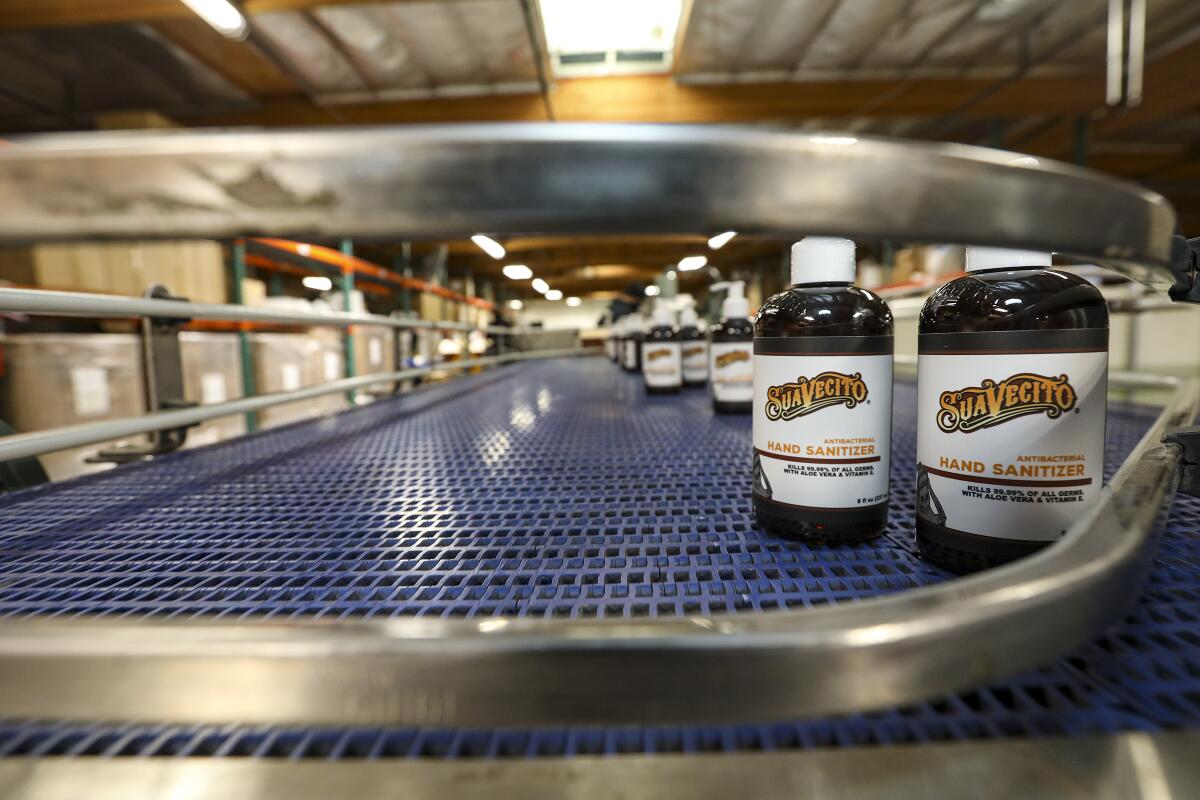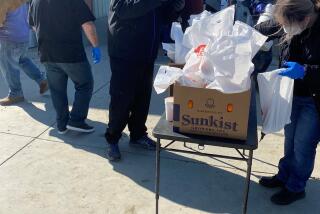This Orange County company has gone from making hair look cool to fighting coronavirus

- Share via
In Santa Ana, the corporate history of Suavecito Inc. is told from the hood to City Hall like a barrio fable.
Brothers Pete and Tony Adame grew up with their pal J-Bird in the rough Santa Nita neighborhood during the 1990s, when the streets were hot. But they all came out OK and got the blue-collar jobs — machinist, line cook, Chipotle burrito wrapper — that they figured were their destiny.
Then Pete Adame lost his job in 2009 as a result of the Great Recession. With a $1,000 severance check, he told the guys it was time to turn their hobby — sweet-scented hair pomade they mixed in 5-gallon Home Depot buckets and gave out to friends in sandwich bags and Tupperware — into a business.
The pomade, named “Suavecito” (literally “smooth” in español, but akin to “hep cat” in Chicano Spanish) became a worldwide sensation. Last year, the company produced more than 6 million 4-ounce cans of their pomade. Baseball superstar Bryce Harper is a fan, along with Social Distortion frontman Mike Ness, and Mexican regional music legends Banda El Recodo.

Now, 34-year-old Pete is Suavecito’s chief executive, 31-year-old Tony is the chief financial officer, and J-Bird — 36, real name Jason Venable — is the executive secretary. Their empire owns and operates two giant production warehouses in Santa Ana staffed by more than 100 people, nearly all of them santaneros with working-class backgrounds like theirs. The company is now a lifestyle brand, with cosmetics, apparel, toys, and even umbrellas emblazoned with its mascot, a Dia de los Muertos-style rockabilly that’s as iconic to this generation of millennial Southern Californians as Rat Fink was to baby boomers in the 1960s.
And now, in this coronavirus era, Suavecito is making hand sanitizer.
It’s not about the money, they say, although Suavecito’s first run of 10,000 1- and 8-ounce bottles sold out in seven minutes with just one Instagram post. Their bigger goal is personal: Hire back the workers they had to furlough because of statewide stay-at-home edicts. Let their largely Latino clientele know that la corona is serious.
And help out the hard-luck city they’ve always proudly repped.
“Here’s where people are getting the least support,” said Tony Adame, as he, his brother and Venable walked around one of their warehouses the week before Easter. About a dozen workers, all young and in masks that didn’t take away from their shimmering pompadours, ponytails and fades, packed boxes or worked at computers. Those who manufactured wore stylish hats or beanies.
It was shipping day. Five thousand 1-ounce hand sanitizer bottles were ready to be donated across Santa Ana — not just to first responders, but also other people who faced potential exposure to coronavirus on a regular basis. Postal workers. UPS drivers. Cashiers.
At a production line that usually produced aftershave and beard spray, the youngest Adame brother, 29-year-old Cesar, placed stickers onto bottles.
“It’s kinda unreal that we’re doing this, but it feels good to help out people,” he said.
His supervisor, Eugene Cayetano, agreed.
“We’ve just been learning on the go, and it’s been go-go-go nonstop,” said the 38-year-old production manager.
Santa Ana has long suffered a bad reputation across Southern California and beyond, stereotyped as too crime-ridden, too Latino, too poor.
It’s an image that Suavecito’s founders have tried to fight against with their company. All their items are labeled “Santa Ana, California” on purpose.
“When we started this, we always wanted to let everyone know where we’re from,” said the soft-spoken Tony Adame. “There’s a lot of good here.”
Coronavirus cases here lag behind those in other Orange County cities. But the economic crisis wrought by the pandemic hangs across the city. Fourth Street, its historic downtown that has gentrified in recent years, stands almost completely shuttered. The streets in Santa Ana, one of the densest big cities in the U.S. are empty.
The downturn hit Suavecito too.

Most of the company’s sales come from mom-and-pop barbers and Chicano boutiques that stock its stuff. Production essentially halted as clients closed down, and Suavecito furloughed 60% of its staff, a move that Tony Adame said was “like someone took our family away from us.”
Then friends, like in the old days, started hitting them up. This time, they needed hand sanitizer.
Nationwide, companies that never imagined they’d ever produce the disinfectant — distilleries, breweries, papermakers, even cannabis shops — have jumped into the business to stay financially afloat.
But many have encountered stumbling blocks: a shortage of ingredients. A steep learning curve. Lack of access to production lines.
In Suavecito’s case, its executives realized nearly everything they needed was in their warehouses.
Tens of thousands of unused spray bottles from discontinued products. A surplus of FDA-approved alcohol and glycerin. Relationships with producers to ensure a steady supply line.
“We felt like a start-up again,” said Pete Adame. “Like, what do we need? Who do we call? Who are the homies that need to get hooked up?”
They started with small batches to test out, then reached out to local businesses such as Chapter One: the modern local.

“They’re looked up to here in Santa Ana,” said owner Jeff Jensen. “These guys, they’re worldwide but they’re focused on what’s the most important thing right now — putting stuff in the hands of people who need it.”
Cal State Fullerton women’s studies professor Melissa Hidalgo brags that she has used the company’s products “since before they were even called Suavecito.” She points out that its release of a hand sanitizer is an action more important than just commerce.
“Sometimes, it’s the damn neighborhood and streets that gets things done,” she said. “And the power in that is in seeing a Latino company saying, ‘Gente, we gotta take care of ourselves. And part of that is keeping your ... hands clean.’”
The Adames have dealt with coronavirus skepticism in their own homes from older relatives, and know that their customers are facing the same. Latinos, who make up about half of the population in Los Angeles County, accounted for 28% of reported COVID-19 deaths.
“They think coronavirus is just like the flu,” Pete Adame said. “But maybe if your sons and daughters are taking it seriously, then maybe you should.”
Tony Adame estimates they’ll produce at least 100,000 bottles of hand sanitizer but don’t plan to be in that business forever. That would require an investment in a whole new production line, and they have other plans. But they’re still thinking of other ways to help Santa Ana. On Easter, Suavecito held a free taquiza (taco catering) outside its warehouse.
And they’re also thinking of producing masks, although there’s a debate about what the design should be.
“It can’t be our main logo,” joked Venable. “You don’t want to see Dad going to Northgate looking like la Muerte.”
More to Read
Sign up for Essential California
The most important California stories and recommendations in your inbox every morning.
You may occasionally receive promotional content from the Los Angeles Times.














